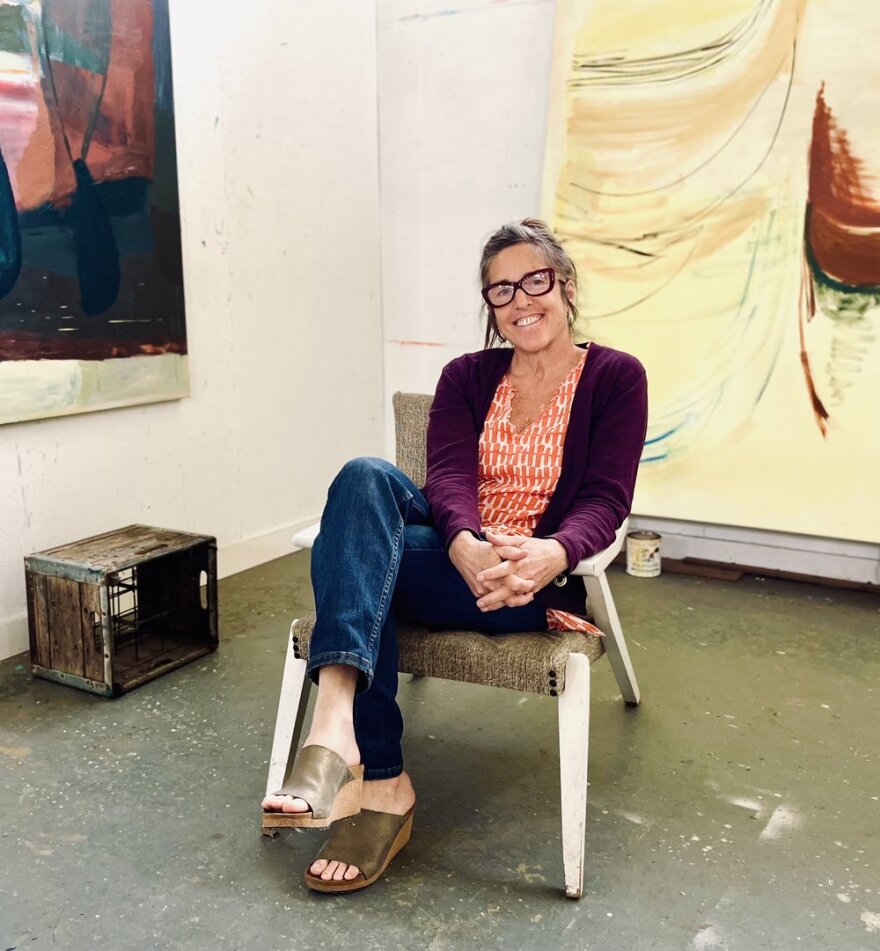Settled by the foot of Burke Mountain, Terry Ekasala spends her days amid large linen canvases, which she will transform into abstract paintings and primitive images. That process of creating — of reimagination, especially — has been with her since she and her cousins would doodle copies of the funnies on scrap paper, encouraged by their grandfather.
Her audience these days is a bit wider. Ekasala, now 61, was this past summer named winner of the Vermont Prize, an award given out by Burlington City Arts, the Brattleboro Museum and Art Center, The Current arts center in Stowe and Hall Art Foundation. She was awarded $5,000, a showcase on the art prize’s website and social media and the publicity that comes with it.
Next month, Ekasala’s work will be placed on display at Burlington City Arts, where it will stay on exhibition until late January.

“I’m proud of myself,” Ekasala said, in her sticking with painting all these years and dedicating as much time as she can to being in the studio.
“It’s all paying off now,” she added soon after.
She started in earnest in the ’80s, living and painting in a Miami studio before moving to Belleville, a neighborhood in Paris, and spending several years as an artist in the French capital. One day she felt an itch to head stateside and later on a whim moved in 2001 to the Northeast Kingdom, where she’s lived and worked ever since.
There she spends hours in a solitary retrofitted barn overlooking the mountain, a place that cultivates creation and expression, she said, “an anchor in my art.”
Some 30 years into her career, she’s refined her style in the Kingdom quiet.
Each canvas she uses, Ekasala constructs by hand. She builds the frame of the canvas, sometimes up to 72 by 84 inches, from wood. Then she stretches sheets of linen over the frame, fastening them with rabbit skin glue and tightening up the fabric, before priming the canvas with several coats of gesso. What comes next is a process based on not having any process at all.
“Every single solitary time I’m scared to death — I don’t know what I’m doing,” she said, half-tongue-in-cheek.
Each painting starts differently, Ekasala said, from the materials used to the image on the canvas. For a while, she used acrylic paint and mixed media, incorporating plaster or sand into the image-making. But for a few years now, she has stuck strictly to oil paints on linen canvases and acrylic on paper.

Ekasala tends to work on multiple pieces at once, something dictated by her style and mediums: Oil paints have a slow-drying nature, and she likes to play with layers and transparency.
“The only thing I am really sure of when I start is mixing the paint,” she said. No plans, no sketches, no goals.
So she daubs and swirls and slashes until, eventually, images start to evolve from the mass of colors and textures, and it all comes together to form the final work. “If I come up with an image really quick, and there’s not enough paint on the canvas, I can’t leave it like that,” she said. Sometimes Ekasala can take months to finish.
She often turns a painting upside down or on its side, looking for a new perspective on the ideas still forming across the linen seams. And each time brush meets canvas a piece evolves bit by bit. In works such as “Air I Breathe,” an oil piece full of blues and greens that evokes hills and hot-air balloons, or “I See You Everywhere,” an acrylic one depicting a ghastly white figure, layered brushstrokes add physical and conceptual depth to the final image. There’s something like movement contained in the canvasses.
When Ekasala won the Vermont Prize this summer, Chrissie Isles, a curator at the Whitney Museum of American Art in New York City, offered this assessment of her work:
“In Terry Ekasala's abstract paintings, perceivable subjects — figures, landscapes, interiors, objects — are evoked, yet never fully revealed. This ambiguity of form, rendered through a deep understanding of the narrative and haptic power of translucently rendered color, suspends the image somewhere between abstract composition and storytelling, creating interior, psychological spaces evoking memory and place.”
Ekasala says she “is always learning,” and you can see it while tracing her career. She was learning when she scribbled with her grandfather on the South Shore of Massachusetts; during her time at the Art Institute of Fort Lauderdale, in Florida; while freelancing art for companies like Hallmark; and still, in her Burke studio, she constantly finds something new.
And through revisiting a medium from her early days — acrylic on paper — she has begun to tap into the spontaneity that exists with a quick-drying paint, reminiscent of the days when her work was filled with clear, defined figures.

Looking through the collection of memories and artwork she has created, Ekasala recalled she “didn’t really understand abstract” until she had been painting for nearly 30 years. It took her that long to find the style that now dominates her artistic creations and has won her awards and art shows.
But it’s those times up in her East Burke studio she likes most. Often she reminds herself to “lighten up and have fun,” to separate the pressure of working for commission and expressing herself through her passion.
Either way, she said, “It all happens within the process.”
The Community News Service is a program in which University of Vermont students work with professional editors to provide content for local news outlets at no cost.




